- Daymar College has been providing exceptional career training since 1963. As a career training school, Daymar College has grown to include 16 beautiful campuses and more than 35 career tracks. Our professional faculty brings real-world experience to the classroom to provide each student with the quality instruction needed to be successful on the job and in life. Small class sizes, day and evening classes, and relevant training are just some of the things that make Daymar College the best place to prepare for your future career. If you're ready for real success in the real world, Daymar College can provide the skills and training needed to get you there. We provide a warm, friendly, nurturing atmosphere where students can learn the skills required to obtain the careers they need to have the lives they want. Our vision is to provide a warm, friendly, nurturing atmosphere where students can learn the skills required, to obtain the jobs they need, to have the lives they want. Our purpose is to stress to all students the importance of a sound general education background in which they can broaden their understanding of society and the complexities affecting that society; to provide education and training to students on a group and individualized basis, helping students realize their full potential in specialized business knowledge and skills; to help students reach a level of social maturity that will be respected in the community as well as in the business world.
School Highlights
Daymar College-Jackson served 34 students (91% of students were full-time).
The college's student:teacher ratio of 5:1 was lower than the state community college average of 23:1.
School Overview
Daymar College-Jackson
(OH) Community College Avg.
Carnegie Classification
Item not available
Baccalaureate/Associate's Colleges: Mixed Baccalaureate/Associate's
Institution Level
Less than 2 yrs
At least 2 but less than 4 years
Institution Control
Private, for profit
Private not-for-profit
Total Faculty
7 staff
93 staff
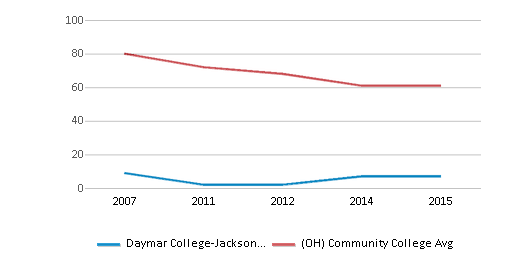
Student Body
Total Enrollment
34 students
533 students
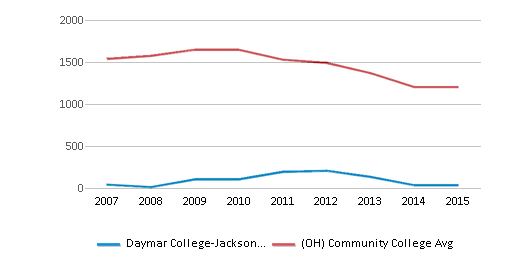
Student : Teacher Ratio
5:1
23:1
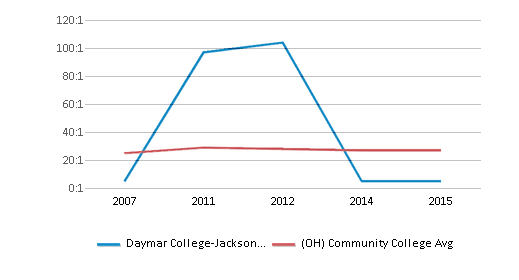
# Full-Time Students
31 students
397 students
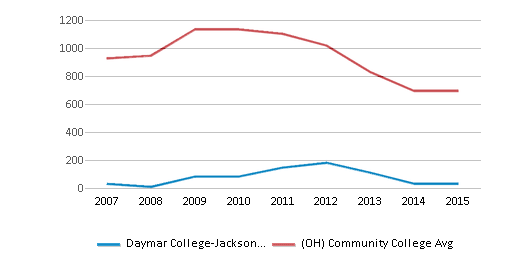
# Part-Time Students
3 students
360 students
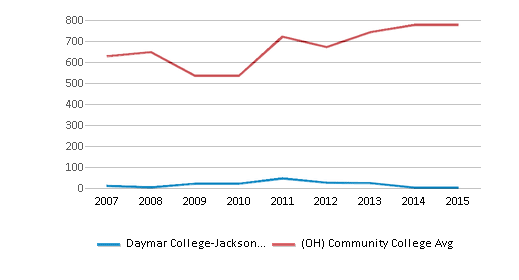
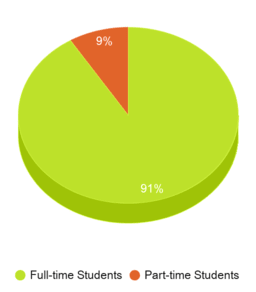
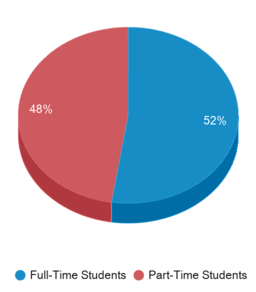
# Enrollment Undergraduate
73 students
308 students
# Full-Time Undergraduate Students
31 students
385 students
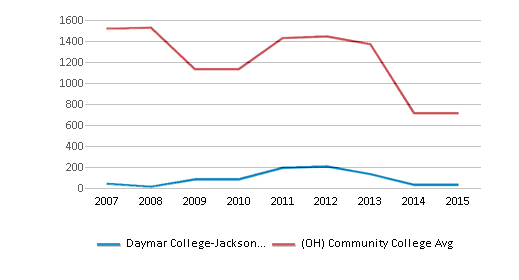
# Full-Time Graduate Students
n/a
10 students
# Part-Time Undergraduate Students
n/a
380 students
# Part-Time Graduate Students
n/a
3 students
Total Dormitory Capacity
n/a
425 students
% Asian
n/a
4%
% Hispanic
n/a
6%
% Black
n/a
15%
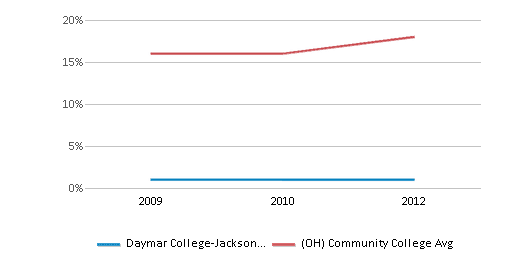
% White
100%
62%
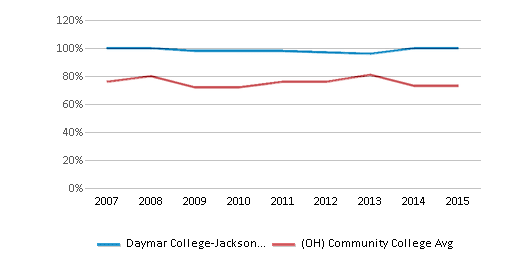
% Hawaiian
n/a
2%
% Two or more races
n/a
4%
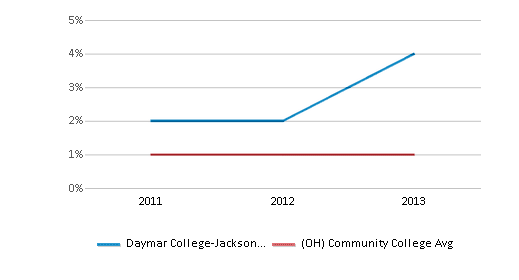
% Non Resident races
n/a
1%
% Unknown races
n/a
6%
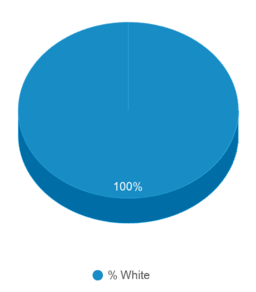
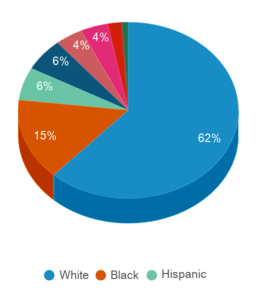
Diversity Score
0.00
0.58
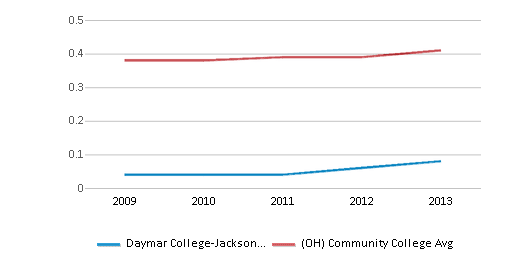
College Completion Rate (Students who graduate in less than 4 years)
46%
22%
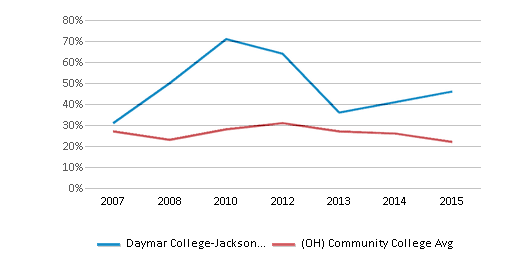
College Completion Rate (Students who graduate in 4 years or more than 4 years)
n/a
0.2197%
Average Graduate Earnings (10 Years)
$24,100
$31,900
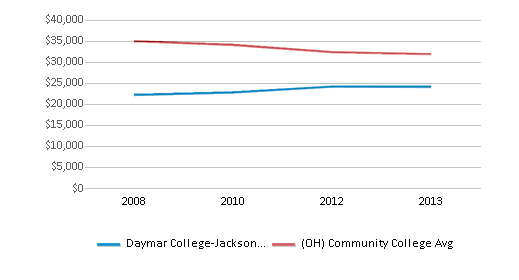
Tuition and Acceptance Rate
Private State Tuition Fees
$17,000
$13,816
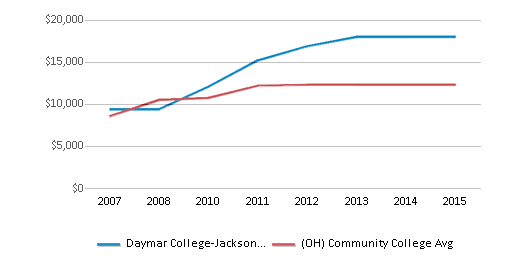
% Students Receiving Some Financial Aid
100%
92%
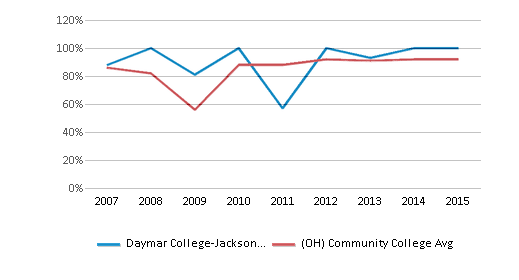
Median Debt for Graduates
$22,797
$20,581
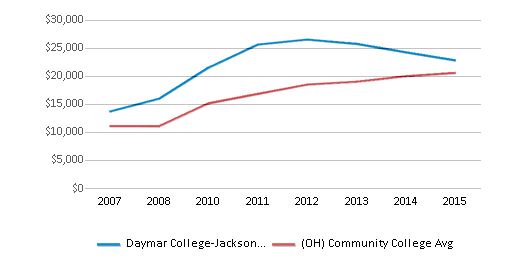
Median Debt for Dropouts
$6,334
$7,090
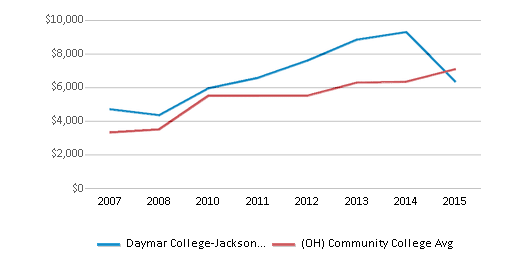
Acceptance Rate
n/a
73%
SAT Reading
n/a
460
SAT Math
n/a
475
SAT Writing
n/a
465
ACT Composite
n/a
21
ACT English
n/a
20
ACT Math
n/a
20
Source: 2015 (or latest year available) Integrated Postsecondary Education Data System (IPEDS)
Frequently Asked Questions
How much does Daymar College-Jackson cost?
Daymar College-Jackson's private state tuition is approximately $17,000.
Recent Articles

How To Craft the Perfect College Admissions Essay
Read on to learn the ins and outs of crafting the perfect college application essay.

Obtaining Your Bachelor's Degree at a Community College
Explore the evolving landscape of community colleges offering bachelor's degrees, addressing affordability, accessibility, and workforce needs.

A to Z of Community College Certificates and Courses
From business and healthcare to technology and skilled trades, the article showcases the breadth of options available to students seeking to enhance their knowledge, develop new skills, or pursue career advancement.






